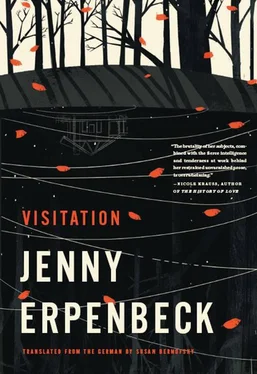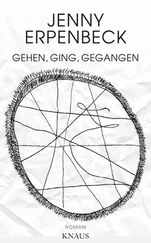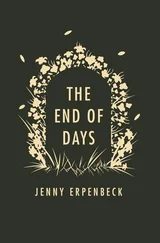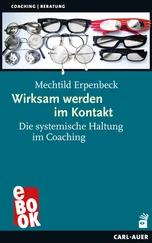She still remembers the stranger who one day, a year or two after the death of her husband but still before the start of the war, had knocked on the gate of the farm. She’d opened it and asked what he wanted. And he had said he wanted to visit his brother, the musician, he’d heard that his brother lived in this village and had even gotten married. The German in which he asked about his brother was antiquated and a little foreign-sounding, just like the German her deceased husband had spoken. No, she’d said, there wasn’t any musician here. Could you maybe give me something to drink, he had asked then. And she had left him standing there before the gate and had gone to fetch a glass of milk, she had waited until he’d finished drinking it, then had taken the glass back from him, wished him a good day and closed the gate to the farm again.
The main thing is that here she can swim again.
Back where she comes from, she never had to lose any thought over whether or not the bread was precious enough to pick up in your hands.
In other places, or so she’s heard, old people like her are just stuck up in a tree and left to starve.
The main thing is that when evening comes she can go swimming again in this shimmering cool green lake.
Her little grandson had wanted to dig up his toy tractor again.
On her way through the garden to the church, her daughter had gotten her veil caught on the red currant bushes.
The dandelions are the same here as at home, and the larks as well.
What silliness.
When it turned out she was already pregnant, her mother let her out of the oven again.
After his injury, his hand always felt cold.
At night, when she takes down her gray knot of hair before going to bed, her hair is still damp.
The hard wood burned longer.
When you got old, your mouth collapsed.
Apples for pears.
At some point the gong sounds, calling them all to supper. Then her granddaughter comes back up from sunbathing on the dock, humming quietly to herself just as she has done all her life, even as a little girl. Which means that in the end there are certain things you can take with you when you flee, things that have no weight, such as music.
IN FALL THE OLD householders invite the gardener to move into the guest room of the main house, this room is on the ground floor, it has its own washbasin and separate entrance, and is easy to heat even in winter with the help of a night storage heater. The gardener accepts the offer. The latest news is that a doctor from Berlin is supposed to be leasing the apiary and erstwhile orchard. While clearing out the shelves in the apiary, the young householder finds a crate filled with silver among the jars of honey. He takes out the silver cutlery and arranges it in the silverware box in the main house. He carries the heating coil, which has been left in the extractor room since the previous winter, back down to the cellar. At exactly the place where a fence once stood, the Berlin doctor has a new fence put up right away, even before the end of autumn, as soon as he’s taken possession of the right-hand part of the property. This is not only his right but his duty, since each leaseholder here is responsible for maintaining the property line on the left-hand side as one faces the water. The gardener is able to show the man from the village who is carrying out this work a few of the old border stones that, hidden beneath bushes, can still be detected here and there.
In the village they’re saying that since the apiary was torn down the gardener has refused to trim his toenails. According to this rumor, the nails have grown down the front of his toes all the way to the underside of his feet and then up behind the feet to his heels, and even though he hides them inside shoes and socks, you can clearly see by his limping gait that something isn’t right. In the village they say that the gardener egged on the householders’ little daughter to rip out bunches of grass and throw them along with the dirt clinging to the roots at the freshly plastered house just erected by the doctor from Berlin, and the clumps of dirt thrown by the girl left stains that are still clearly visible. In the village they say that the workers from Berlin who were to drag the bathing house up the hill all showed up for work wearing suits and ties, and that they wore dark-colored windbreakers over their suits as camouflage, information ostensibly provided by the gardener. In the village they say that the new leaseholder of the parcel of land once owned by Jews, this very doctor from Berlin, was to blame for the fact that the senior householder, who went into the hospital with nothing more than a head cold, soon died there. The doctor intentionally gave the man too many shots, they say, because the narrow right of way down to the lake wasn’t enough for him, he wanted to have the dock as well, the gardener could certainly attest to this. Finally the gardener, they say, has reported that this Berlin doctor recently, after a celebration in the village pub The Crooked Spruce, went sneaking across his own property with a girl from Frankfurt an der Oder down to the water and from there climbed over the fence so as to make this very dock, the use of which was never granted him by the municipality, the site of an adulterous encounter. The gardener, they say, saw it with his own eyes.
After the death of the old householder, his son, the young householder, leases the workshop as weekend quarters to a young married couple from the district capital who keep their sailboat docked in the village harbor. In exchange, the two agree to regularly mow the lawn on the big and small meadows in summer. The daughter of the young householder and her friend from the neighborhood are allowed to hold the funnel when the gardener helps the subtenants fill the lawnmower with gasoline.
YOU HAVE TO DECIDE that on your own, he’d said. And she had said yes. And after this yes she collapsed into a weeping ball without his knowing at first what the matter was. His wife who hadn’t even cried the first time she sat across from him in the visitation room at the prison. At the time he had said: I would have sent for you. And she had replied: I know. Nothing more than that. Let alone bursting into tears. Shortly after his release he had then quietly married her. Today, thirty years later, all he had done was say in the course of a conversation: You have to decide that on your own. And she had said something that sounded like “yes,” though admittedly the “yes” hadn’t been completely clear, and then she had begun to tremble, and since he’d thought she was cold, he’d put his arm around her. On many evenings they’d sat out of doors like that until late at night, side by side on the garden swing beneath the light of the lantern, chatting or in silence, gazing out in parallel lines into the blackness, at the lake whose waves softly lapped in the darkness. Startled by the sound of her crying, he at once withdrew his arm and looked at his wife as he had never before looked at her in thirty years of marriage. Then he got up and walked over to the dock without first, as usual, using his hands to part the branches of the old willow tree that hung down like a curtain above it. So now he stands there, gazing out into the night as his wife continues to sob on the shore behind him. Bawling on the bench, he thinks and can’t help grinning. And this grin pulls the corners of his mouth into so wide a grimace that he cannot pull them back again. He stands there on the dock, just at the point where it meets the shore, that place he had stepped to so decisively when his wife had suddenly begun to cry, as though he were striding into a staff dining room or over to the cash register at a department store, not even paying attention to how the branches of the old willow tree scratched against his face, just stands there, grinning out into the night. Lord only knows. Today during the day they’d gone for a sail, the wind was light. She’d held the sheets, he’d hoisted the sails and now and then steered a little.
Читать дальше












